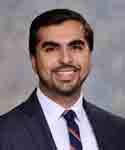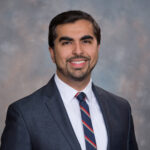ViRL lectures were designed for a core audience of rheumatology fellows, says Dr. Bolster. But residents, faculty and practicing rheumatologists, such as Mohammad Ursani, MD, CCD, RhMSUS, who practices at Millennium Physicians in The Woodlands, Texas, have registered too. He streamed sessions on ANCA vasculitis, spondyloarthritis, systemic lupus erythematosus and systemic sclerosis.
“I watched the lectures, because I believe it is very important to participate in lifelong learning,” says Dr. Ursani. “Rheumatology is changing at a very rapid pace, and it would be a complete disservice to our patients if we were not dedicated to keeping up with the most current data. It’s always a pleasure to have the opportunity to listen to the leading scholars of our field whenever the chance presents itself. Their enthusiasm and interest in their topic of focus are contagious.”
Because ViRL lectures streamed live during his normal clinic hours, Dr. Ursani appreciates the opportunity to catch recorded sessions after work. “The quality of the content is exceptional, and the topics are relevant and up to date. The speaker choice is also fantastic, given that they have an affiliation with the topics they speak about.”
Interactive Talks
Speakers presented one-hour lectures with slides, joined by a faculty member and a fellow moderator who field audience questions for the speakers submitted through an online chat function. Sessions were recorded and stored on the ACR website so registered participants may watch them later. The ACR staff has also provided technical support. ViRL sessions cover the gamut of rheumatology topics, from Scleroderma and the Gut to RA Pathogenesis to Cases and Mimics in Axial Spondyloarthritis. Written summaries are also available.
“I delivered the first lecture to make sure it worked. There’s a learning curve with Zoom. But it went very smoothly. More than 500 people actively streamed in, and they listened the whole time and seemed very energized,” says Dr. Dua. Her moderator, Dr. Jonas, fielded more than 100 questions from participants, then selected a few pertinent ones for Dr. Dua to answer.
ViRL has drawn registrants from as far away as the Philippines, France, Oman and Nigeria says Dr. Dua.
“It has gone very smoothly, and the ACR has made it free to all interested learners, [driving] international interest. People are joining in from different time zones and are able to access these great speakers. They can ask questions and answer each other’s questions. This is collaborative learning and teaching at the same time. It’s about leveraging other programs to tap into their deep expertise and knowledge,” she says. ViRL’s organizers are investigating how to make the lectures eligible for continuing medical education or maintenance of certification credits in the future.



